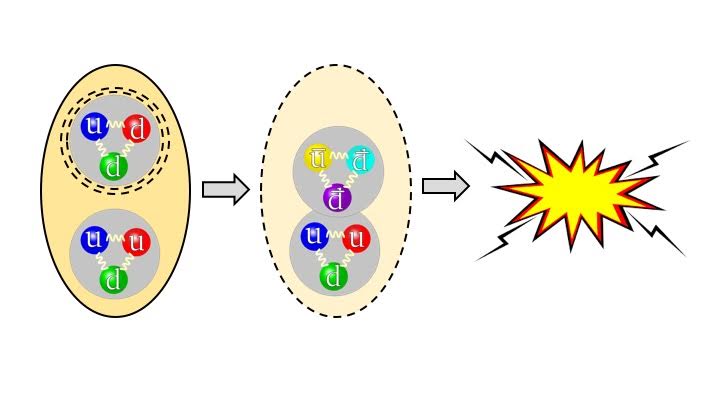Femke Oosterhof and Rob Timmermans - Publication in Physical Review Letters
An interesting class of beyond-the-Standard-Model-physics models violates baryon number by two units. In such models, which are motivated by the cosmological matter-antimatter asymmetry, the proton is stable but neutrons oscillate into antineutrons and otherwise stable atomic nuclei can decay. An outstanding problem is how to relate nuclear decay rates to the underlying baryon-number-violating interactions among quarks and gluons.
In this letter, we develop a new framework based on effective field theory to overcome this challenge for the deuteron. We use the concept of unitarity to relate the lifetime of the deuteron to physical quantities related to the scattering of nucleons and antinucleons. We argue that for most sources of baryon-number violation a direct connection exists between neutron-antineutron oscillation time and the deuteron lifetime. In particular, we show that experiments on the latter set a more stringent limit on the neutron-antineutron oscillation time than previously thought.
However, for one particular source of baryon-number violation the ratio of nuclear lifetimes and the neutron-antineutron oscillation time can be very different. This would allow for the partial identification of the symmetry-breaking sources. Our results are of interest to a broad audience of theorists and experimentalists in nuclear and particle physics and cosmology.
The article can be read in Physics Review Letters.

| Last modified: | 21 June 2023 1.17 p.m. |
More news
-
24 March 2025
UG 28th in World's Most International Universities 2025 rankings
The University of Groningen has been ranked 28th in the World's Most International Universities 2025 by Times Higher Education. With this, the UG leaves behind institutions such as MIT and Harvard. The 28th place marks an increase of five places: in...
-
05 March 2025
Women in Science
The UG celebrates International Women’s Day with a special photo series: Women in Science.
-
16 December 2024
Jouke de Vries: ‘The University will have to be flexible’
2024 was a festive year for the University of Groningen. In this podcast, Jouke de Vries, the chair of the Executive Board, looks back.
